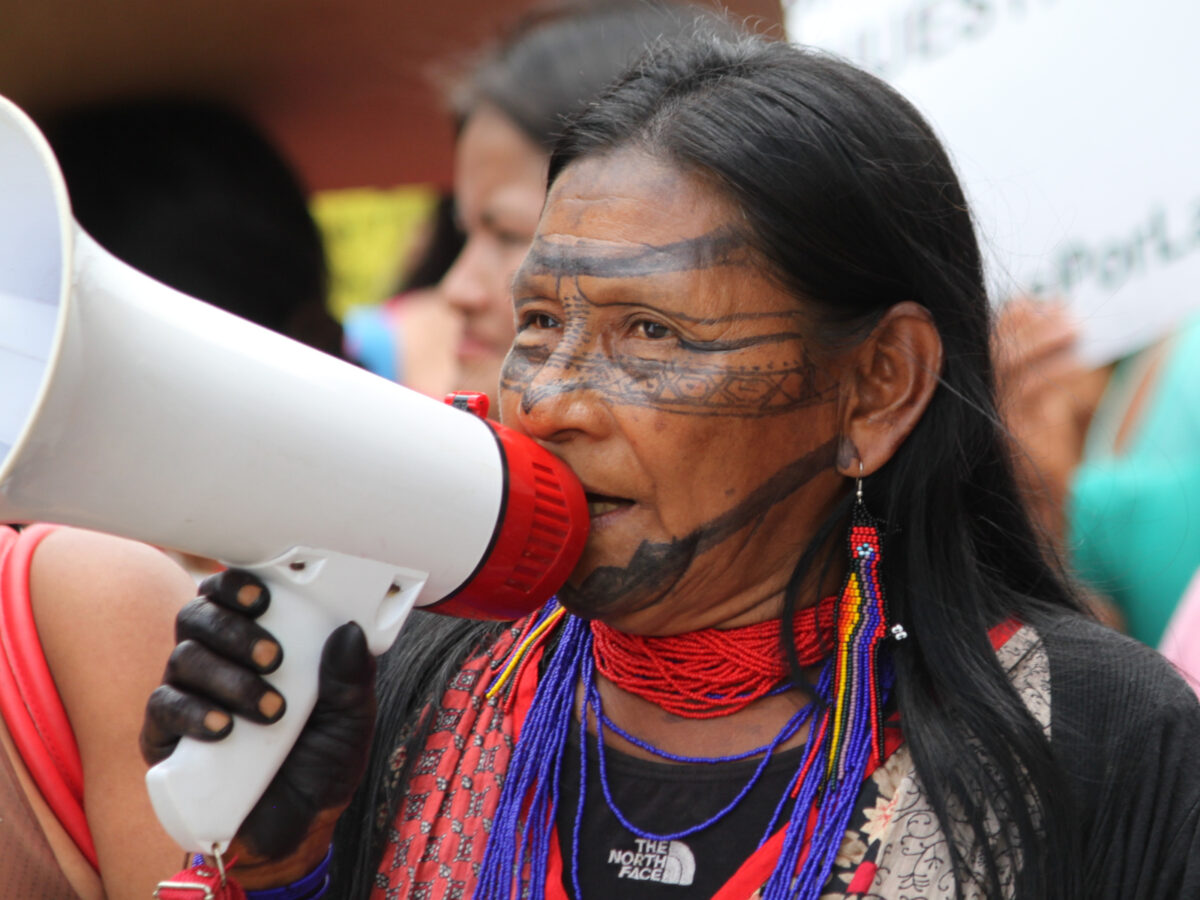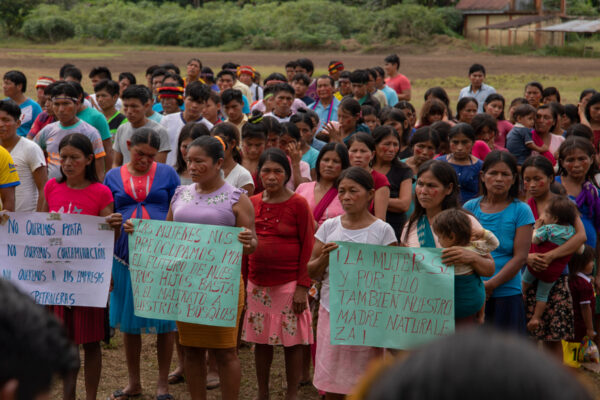On February 9, Ecuador held presidential elections against the backdrop of a political, economic, security, and social crisis. Ecuadorians will head back to the polls on April 13 for a decisive runoff election that could drastically shape the health of the Ecuadorian Amazon.
Both current President Daniel Noboa and opposition candidate Luisa González have endorsed continued extractivism and oil drilling in the Amazon, weakened Indigenous territorial governance, and increased political persecution of their opponents.
President Noboa, who obtained 44.6% of the votes, has led a term marked by militarization, an energy crisis, and human rights violations. González, representative of the political movement of former president Rafael Correa who obtained 44.02% of the vote, ran on a leftist-leaning platform to expand social policies, but also has a record of deepening extractivism, corruption, and persecution of her adversaries.
Yet, the Indigenous movement led by Leonidas Iza, the third political force in the country who obtained 5.24% of the vote, will be key to tipping the scales of the election. Iza has been one of the strongest opponents of extractivism and the policies of right-wing governments. Amid rampant state violence and the ongoing governmental failure to implement the Yasuní popular referendum, Indigenous and frontline organizing will only intensify, keeping the fight to End Amazon Crude and usher a new era of climate justice in the country alive.
Noboa’s legacy: militarization, crisis, and repression
Daniel Noboa assumed the presidency on November 23, 2023, after winning an extraordinary “crossed death” election called by Guillermo Lasso, who thus avoided an impeachment trial for corruption.
From the beginning of his term, Noboa faced an unprecedented security crisis, with Ecuador becoming one of the most violent countries in the hemisphere. In response, he decreed an internal armed conflict and launched Plan Fénix, a security policy based on the militarization of the country, prolonged states of emergency, and vastly increased security spending.
Despite his “iron fist” policy, homicides have skyrocketed. This January was the bloodiest month in the country’s history with 731 murders, almost double the 493 that were committed in January 2024.
Most alarming has been the increase in human rights abuses, forced disappearances, and extrajudicial executions. An emblematic case occurred in December 2024, when four Afro-descendant children, Josué Didier Arroyo Bustos, Ismael Arroyo Bustos, Steven Gerald Medina Lajones, and Nehemías Saúl Arboleda Portocarrero, were detained by the military and tragically found incinerated 25 miles from their homes.
The Permanent Committee for the Defense of Human Rights denounced in its report, Forced Disappearances in the Context of Militarization in Ecuador that in 2024, 16 cases were registered on the Ecuadorian coast, with 27 disappeared victims, 9 of which are minors. These figures reveal an unprecedented escalation of state repression.
This security crisis was compounded by a serious energy crisis, resulting from a lack of investment in hydroelectric infrastructure and a prolonged drought. During 2024, Ecuador suffered multiple blackouts of up to 14 hours a day, affecting the economy with millions in losses.
Consolidation of power and threat to Amazonian Indigenous rights
During 2024, Daniel Noboa consolidated his alignment with the United States, securing security and trade agreements, in a context where the Ecuadorian government was seeking international financial support and political backing. In September 2024, Noboa presented an initiative to the Constitutional Court that would potentially allow the establishment of foreign military bases in Ecuadorian territory.
At the same time, in early February 2025, Noboa proposed another constitutional reform to eliminate the right to prior consultation (Art. 57) and the right to resistance (Art. 98). These measures would weaken the ability of Indigenous and campesino communities to resist extractive projects in their ancestral territories.
This announcement coincided with the finalization of negotiations for the signing of a Free Trade Agreement with Canada, a country whose companies own vast mining concessions in Ecuador, some of which are linked to the Noboa family. At the same time, his administration promoted its openness to new foreign mining investments, which are certain to escalate socio-environmental conflicts in Indigenous territories.
This scenario is compounded by an increase in illegal gold mining, which has become the most profitable criminal activity in the Ecuadorian Amazon. According to our latest report, Gold, Gangs and Governance: Indigenous Communities in the Grip of Organized Crime, criminal organizations have begun to reinvest drug trafficking profits in the illicit extraction of gold due to its high profitability and the ease with which it is traded on international markets. This dynamic has triggered a fierce struggle for territorial control, raising levels of violence, extortion, recruitment, and killings throughout the region.
In addition, the boom in illegal mining has facilitated the expansion of other illicit markets, such as the clandestine trafficking of mercury, arms, and drugs, which has strengthened criminal groups operating as protection forces within the mining enclaves. In this context, the combination of extractivist policies, institutional weakness, and the expansion of organized crime poses an unprecedented threat to Indigenous territorial governance and socio-environmental stability in the Ecuadorian Amazon.
Does Rafael Correa’s legacy define Luisa González?
The candidacy of Luisa González, from the Revolución Ciudadana party, represents the continuity of Correísmo, a movement that governed Ecuador between 2007 and 2017 under a model of massive public investment, expansion of social services, and strong state control over strategic sectors. Its administration was distinguished by a vertical exercise of power, a confrontational narrative, and deep social polarization.
In the beginning, Correísmo aligned itself with the demands of social, Indigenous, and environmental movements, promoting an agenda that expanded basic services and infrastructure and reduced inequalities. However, over time, the party was marked by the promotion of extractivism and multiple conflicts and corruption scandals.
Another characteristic of Correa’s government was the political persecution and criminalization of dissenting voices, which accentuated the fractures within Ecuadorian society. An emblematic case of his extractivist approach was the attempt to block the popular referendum on oil exploitation in Yasuní, which finally took place in 2023, almost a decade into his presidency.
In 2012, he granted the first large-scale mining contract to the Mirador project, an open-pit copper mine operated by the Chinese company Ecuacorrientes in the heart of the Cordillera del Cóndor, despite complaints about the lack of consultation with Shuar Indigenous peoples and other communities in the area.
Currently, Correísmo maintains solid popular support, especially in sectors that value its legacy of social investment. Recent electoral results show its resurgence, especially on the Ecuadorian coast. However, the movement faces the challenge of overcoming accusations of corruption and dispelling fears of a return to an authoritarian and polarizing model, which once restricted political pluralism and consolidated a power structure based on confrontation and centralization.
The Indigenous movement could tip the electoral scale
Despite having obtained only 5.24% of the votes in the first round, Leonidas Iza and the Indigenous movement emerged as a key player in the definition of the next government. His leadership within the Confederation of Indigenous Nationalities of Ecuador and his trajectory as one of the main opponents of neoliberal policies and extractivism position him as a leader of a growing social and political resistance.
Historically, the Indigenous movement has played a decisive role in the moments of greatest political tension in Ecuador, having been the protagonist of popular uprisings and mobilizations that have influenced the course of the country. The movement will continue to play a crucial role in the second round of elections, as its support base could tip the balance between Noboa and González.
The challenge for the Indigenous movement lies in defining their strategy in a scenario where both candidates have supported extractivism, the use of public forces to quell social protest, and positions in opposition to Indigenous rights.
While Noboa has prioritized militarization and the elimination of prior consultation, Correísmo, despite having promoted social policies, has also supported an economic model based on the expansion of the oil and mining frontier.
This added to the challenge of confronting the expansion of organized crime and the mining that is expanding along the main rivers of the Ecuadorian Amazon, such as the Napo and Zamora, and the climate discussions that will be concentrated at COP 30 in Belem, Brazil in November of this year.
The dilemma for the Indigenous movement will be whether to adopt a position of neutrality, support one of the candidates under specific conditions, or promote the null vote as a message of rejection of the current political model. In any case, its capacity for mobilization and organization makes it a decisive factor in the outcome of these elections and the future of the Ecuadorian Amazon.












